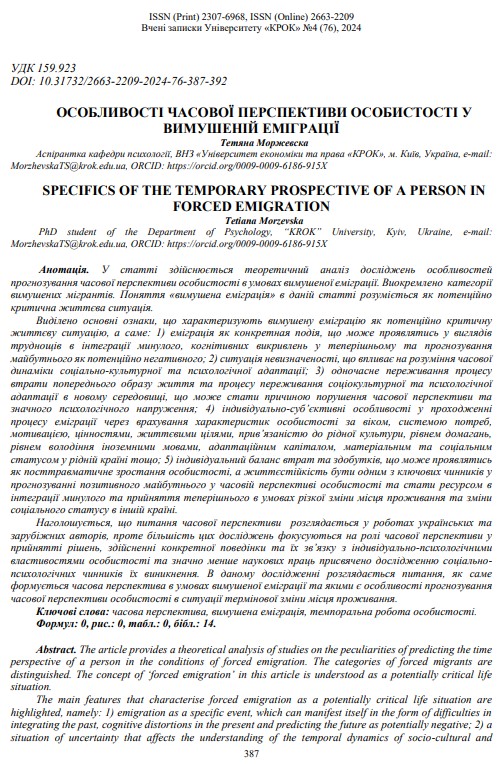SPECIFICS OF THE TEMPORARY PROSPECTIVE OF A PERSON IN FORCED EMIGRATION
DOI:
https://doi.org/10.31732/2663-2209-2024-76-387-392Keywords:
time perspective, forced emigration, temporal work of the individualAbstract
Abstract. The article provides a theoretical analysis of studies on the peculiarities of predicting the time perspective of a person in the conditions of forced emigration. The categories of forced migrants are distinguished. The concept of ‘forced emigration’ in this article is understood as a potentially critical life situation.
The main features that characterise forced emigration as a potentially critical life situation are highlighted, namely: 1) emigration as a specific event, which can manifest itself in the form of difficulties in integrating the past, cognitive distortions in the present and predicting the future as potentially negative; 2) a situation of uncertainty that affects the understanding of the temporal dynamics of socio-cultural and psychological adaptation; 3) simultaneous experience of the process of losing the previous way of life and the process of experiencing socio-cultural and psychological adaptation in a new environment, which can cause a violation of the time perspective and significant psychological stress. 4) individual and subjective peculiarities in the emigration process by taking into account the characteristics of the individual in terms of age, system of needs, motivation, values, life goals, attachment to the native culture, level of aspirations, level of foreign language proficiency, adaptation capital, material and social status in the home country, etc; 5) an individual balance of losses and gains, which can manifest itself as post-traumatic growth of the individual, and resilience can be one of the key factors in predicting a positive future in the time perspective of the individual and become a resource in integrating the past and accepting the present in the context of a sharp change of residence and change of social status in another country.
It is noted that the issue of time perspective is considered in the works of Ukrainian and foreign authors, but most of these studies focus on the role of time perspective in decision-making, implementation of specific behavior and their relationship with individual psychological properties of a personality, and much less research is devoted to the study of socio-psychological factors of their occurrence. The present study examines how the time perspective is formed in the conditions of forced emigration and what are the peculiarities of predicting the time perspective of a person in a situation of urgent change of residence in accordance with the purpose of the study.
Downloads
References
Дідковська, Л. І., & Дідковський, А. П. (2023). Психологія потенційного емігранта. Львів: Растр-7.
Дідковська, Л. І. (2023). Ставлення до еміграції та ціннісні орієнтації особистості. Журнал сучасної психології, 1(28), 51-59. doi: 10.26661/2310-4368/2023-1-6.
Конвенція про статус біженців 28.07.1951 року. Офіційний портал Верховної ради України (2002). URL: https://zakon.rada.gov.ua/laws/show/995_011#Text.
Сеник, О. М. (2016). Соціально-психологічні чинники уявлень студентської молоді про часову перспективу. (Кандидатська дисертація). Львівський національний університет імені Івана Франка. Доступ через URL: https://ispp.org.ua/2020/05/06/senik-o-m-socialno-psixologichni-chinniki-uyavlen-studentsko%D1%97-molodi-pro-chasovu-perspektivu/.
Сингаївська, І. В., & Страмоусова, І. Є. (2024). Чинники життєстійкості жінок під час війни. Вчені записки Університету «КРОК», 3(75), 231-245. doi: 10.31732/2663-2209-2024-75-231-245.
Склярова, Г. О. (2024). До питання про ситуації невизначеності мирного та воєнного часу. Вчені записки Університету «КРОК», 3(75), 254-258. doi: 10.31732/2663-2209-2024-75-254-258.
Слюсаревський, М. М., & Блинова, О. Є. (2013). Психологія міграції. Кіровоград: ТОВ «Імекс ЛТД».
Buehler, R., & McFarland, C. (2001). Intensity bias in affective forecasting the role of temporal focus. Personality and Social Psychology Bulletin, 27, 1480-1493.
Herman, J. L. (1997). Trauma and recovery. New York: Basic books.
Horowitz, M. J. (1986). Stress response syndromes. (2nd.ed.). New York: J. Aronson.
Maddi, S. R. (2002). The story of hadiness: twenty years of theorizing, research and practice. Consulting psychology journal, 54, 173-185.
Magomed-Eminov, M. S. (1997). Post-traumatic stress disorders as a loss of meaning of life. States of mind. D. Halpern & A. Voiskunsky. Oxford University Press, 238-250.
Newby-Clark, I. R., & Ross, M. (2003). Conceiving the past and future. Personality and Social Psychology Bulletin, 29, 807-818.
Zimbardo, P. G., & Boyd, J. N. (1999). Putting time in perspective: a valid, reliable individual-differences metric. Journal of personality and social psychology, 77, 1271-1288.

Downloads
Published
How to Cite
Issue
Section
License

This work is licensed under a Creative Commons Attribution-NonCommercial 4.0 International License.

